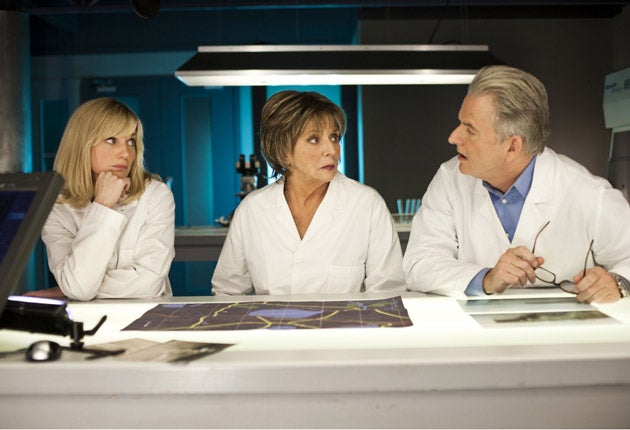In television, all's bad that ends badly
From The Sopranos to Waking the Dead, the best series consistently fail to finish on a satisfying note, says Ben Walsh

Your support helps us to tell the story
From reproductive rights to climate change to Big Tech, The Independent is on the ground when the story is developing. Whether it's investigating the financials of Elon Musk's pro-Trump PAC or producing our latest documentary, 'The A Word', which shines a light on the American women fighting for reproductive rights, we know how important it is to parse out the facts from the messaging.
At such a critical moment in US history, we need reporters on the ground. Your donation allows us to keep sending journalists to speak to both sides of the story.
The Independent is trusted by Americans across the entire political spectrum. And unlike many other quality news outlets, we choose not to lock Americans out of our reporting and analysis with paywalls. We believe quality journalism should be available to everyone, paid for by those who can afford it.
Your support makes all the difference.Waking the Dead, the reliably bonkers BBC crime series featuring Trevor Eve's exquisitely hammy Detective Superintendent Peter Boyd, came to an end this month.
And, like so many great TV shows before it, it ended rather tamely. The final two episodes were the usual giddy blend of gore, torture, tension and torment, with Boyd's team investigating the disappearance of 16 homeless boys. But the final scene felt limp and unfulfilling. Boyd, having been turfed out of his Cold Case Unit for his unorthodox methods, had a brief chat with his team underneath Waterloo Bridge, before setting off who knows where... Couldn't we have had more? A bit of resolution? A happy ending?
Most TV shows – American and British – seem to end terribly these days. There are no elegant conclusions, just a feeling of loss and confusion. Compelling series like Life on Mars/Ashes to Ashes and Lost finished in a sea of bafflement and quasi-religious piffle... and, by the way, here's a spoiler alert for those still hoping to watch the box sets.
So, Gene Hunt was God? Or a guardian angel? Or some sort of "entertainer" for murdered cops in Purgatory? That meant Hunt was aware of this all along – from the first episode of Life on Mars. Which rather negated a lot of the series, didn't it?
Lost started so well, kicking off with a sensationally visceral plane crash and an atmosphere of genuine creepiness, but ending with the cop out that all the characters were... wait for it... dead. Life on Mars had a similarly explosive start. However, once the writers had patted themselves on the back for their wonderful brainchild and viewers had started relishing Gene Hunt's witticisms, said writers lost track of where they were going. Sci-fi concepts such as these really have to lead somewhere. They are not Holby City or Hollyoaks. "Great idea" television must end satisfactorily. It very rarely does. Also see Heroes.
The epic American drama The Wire came close, hinting at what its large cast of characters would do with their lives, but The Sopranos (the greatest of all US TV series) ended too mystifyingly. Its creator, David Chase, has maintained that all the clues are there in the final sequences and lengthy essays have been written about what actually happens to the Soprano family in that diner. Are they in a witness protection scheme? Is Tony rubbed out at his table? But really, it was an untidy letdown. In the end, you just need to know that Tony Soprano has been bumped off. You need to see it.
Ending a series poorly isn't a new phenomenon. The wonderful sitcom Cheers, which ran for 11 seasons between 1982 and 1993, ended on an unnecessary downer. Instead of allowing Ted Danson's Sam Malone to ride into the sunset with his great love, Diane (Shelley Long), the writers had him choosing to stay in his Boston bar with an unhinged postman, Cliff, and the sozzled accountant Norm. Quantum Leap (1989 -93) also ended glumly, with Scott Bakula's Dr Sam Beckett deciding to be trapped in his time-skipping purgatory for eternity. The list is endless. In the final scene of Angel we see the vampire busters on the verge of death. In Frasier the shrink lands in Chicago, going on to who knows where. In Blake's 7 the crew are wiped out and Avon is executed off screen. In Dallas, JR toys with shooting himself. Of course, some great shows end badly because they are cancelled – Twin Peaks, which ended on an unresolved cliffhanger, and Deadwood are the most dispiriting examples.
One dreads to think what the BBC will do with its long-running guilty pleasure, Spooks – one very much doubts that all will end merrily, Harry Pearce skipping through a Perthshire field with Ruth. My money is on witnessing the agonising, grisly death of Pearce, Ruth or both – just to make the heavy-handed point that working for the intelligence services is a very bleak business indeed. Wouldn't it be kinder to end it like Friends (Rachel and Ross end up together) or the unequivocably lovely Due South, in which the mountie, Benton, his pal Ray and his wolf, Diefenbaker, walk off into the sunset together?
Join our commenting forum
Join thought-provoking conversations, follow other Independent readers and see their replies
Comments